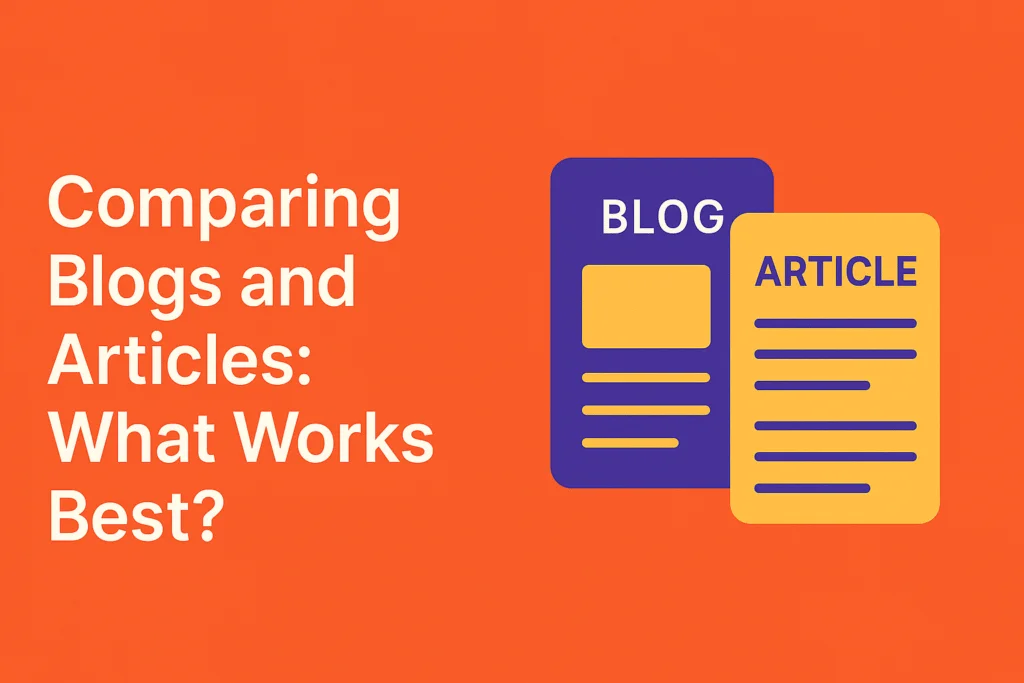Many business owners see “blog” and “article” as the same thing. Both forms share common points, yet each has specific traits that fit specific goals. This piece looks at blog vs. article content to show how they differ, how each helps with SEO, and which fits specific branding needs. Knowing their roles helps shape a plan that connects with readers and search engines. By the end, you can decide which type fits your business goals best.
Overview
Knowing the difference between blog and article writing helps shape content strategies. Some pieces favor deep and thorough analysis, while others rely on personal angles. This review clarifies which is better—blog or article—for branding, SEO, and reader engagement across different industries.
Understanding the core difference between blog and article
Blogs and articles seem alike, yet they serve different roles. Blogs often explore personal insights or brand stories, while articles stay formal and factual. Each shape reaches different readers and fits specific brand goals. Knowing these differences helps businesses plan their content approach and keep it relevant, whether they seek casual engagement or in-depth research. This distinction guides strategy.
Define what a blog is and its key features
Blogs serve as active spaces where brands or people share stories. They often use a casual tone and first-person viewpoint. Usually, blog posts start at 300 words and go up to 2000 words (Eleven Writing). This format makes them easy to read, encouraging feedback and shares. They may actively include quick tips or behind-the-scenes posts. These features create a personal bond with the reader, increasing recurring visits. A blog also supports exposure by reaching people through targeted topics and social media.
Explain what an article is and its main traits
An article focuses on facts, research, and well-reasoned viewpoints. It follows an organized method to explain a topic, using third-person language to stay neutral. A complete and well-researched article can exceed 5000 words (Eleven Writing). Writers often present data or expert interviews to support claims. This format builds trust and educates focused readers. Articles require careful research to check facts. They add expertise to websites or publications by offering detailed coverage, which helps readers gain a clear understanding of the subject.
Highlight how their purposes and styles differ
While many people use these terms in the same way, blogs and articles are not the same (Eleven Writing). Blogs bring a personal feel, frequently focusing on stories and casual discussion. Articles keep a formal sound, using objective evidence to prove points. Blogs suit ongoing updates and opinions, whereas articles handle structured research. Both share content goals, like educating or informing, but each format has unique style choices. A blog invites discussion through comments, and an article presents data for those seeking depth.
Blog vs article writing for SEO success
Many marketers debate which format ranks higher on search engines. Both blog vs. article approaches can improve visibility if they match user needs. Blogs often draw quick engagement, while articles use deeper research. Search engines favor relevant content, so a well-written blog or article helps bring visitors. The key is matching style, depth, and keywords carefully for the best results.
Analyze which format is favored more by search engines
Search engines want content that answers user queries quickly and accurately. WordPress sees 70 million new posts each month (SearchVolume.io), which shows how blogs fill the web with fresh info. Still, articles can also earn top rankings if they present fully researched perspectives. The search algorithm values clarity, completeness, and expertise over format alone. Blogs get attention with frequent updates, but articles become notable through depth. The best approach depends on how well you answer a question and keep readers engaged.
Break down article vs. blog in driving organic traffic
Companies that use blog content well generate 67% more leads per month than sites that do not (Captain Words). Blogs often attract organic visitors with their friendly approach and consistent updates. Articles also drive traffic, though they may attract more users who look for longer, detailed info. Both formats benefit from planned keyword use, which helps search engines match user intent. Each can convert visitors into leads, but blogs might encourage more frequent visits, while articles build expertise in niche fields.
Explore best type of content for SEO gains
SEO success depends on matching content to user intent. Blogs target broader, current topics for quick engagement, while articles are better for thorough coverage that attracts backlinks. Each approach can achieve top results if it answers queries well. Brands mix both to balance frequency with depth. Short blog posts handle trending subjects, and articles address focused matters. Provide strong headlines, relevant keywords, and structured layout to satisfy search engine needs. That strategy builds expertise, builds trust, and supports climbs in search rankings.
Comparing blogs and articles for business outcomes
Companies want content that increases brand presence and leads. Comparing blogs and articles for business reveals how each media choice influences trust, audience growth, and industry presence. Blogs work well for casual, frequent engagement that makes more human a brand, while articles support trust with expert details. Each fits different goals, so firms often mix them for balanced results and more lasting conversions.
Which is better blog or article for business branding
Businesses with blogs receive 67% more leads than those without (Tendo Communications). This shows how blogs truly develop a company’s voice and draw interaction. Articles remain important for branding, too, by offering a look and expert stance. Both shapes build trust, but blogs feel more personal, while articles demonstrate expertise. The question is which fits your brand identity. If you want an open persona, blogs help. If you need prestige, articles grab attention. Many brands balance both to engage wider audiences.
Target audience and engagement differences
Blogs tend to have a more friendly feel, whereas articles are more formal. This difference affects how readers interact. Casual audiences may comment or share blog posts, while those seeking detailed data prefer articles. Blogs invite quick feedback and help build personal ties. Articles, with their logic, capture groups who want depth. In business, picking the right format depends on who you want to reach. A casual consumer prefers blog content, and a professional might search for detailed articles.
Use cases of blogs and articles across industries
Many brands publish review articles to show solutions for buyers. This approach appears in industries like remodel or tech, where a blog might review different products. Comparison articles are one of what we call “The Big 5,” which drive traffic and sales (IMPACT+). In healthcare, a blog can share wellness tips, while an article covers research. Retailers post blogs for new trends and articles for in-depth guides. Each industry adapts the format to meet consumer needs and show product or service info.
Conclusion
Blogs and articles both have different purposes, though they often merge in modern marketing. A blog invites discussion, shares personal angles, and keeps audiences updated with shorter, casual posts. An article uses a more professional voice for in-depth content that uses data or research. Each format can open doors to new visitors, higher engagement, and stronger trust. The final choice depends on brand identity, audience profile, and the nature of the topic. Some businesses write frequent blogs for an active community, plus trusted articles to gain authority. Either way, consistent, thoughtful, search-friendly content helps connect with readers, build trust, and move toward meaningful business growth and ongoing loyalty.
FAQs
What is the major difference between blog and article writing?
Which performs better for brands: blog vs article?
Can articles help rank better in SEO than blogs?
Is a blog or article more suitable for small businesses?
How do I decide which is better blog or article for my strategy?

Ridam Khare is an SEO strategist with 7+ years of experience specializing in AI-driven content creation. He helps businesses scale high-quality blogs that rank, engage, and convert.



